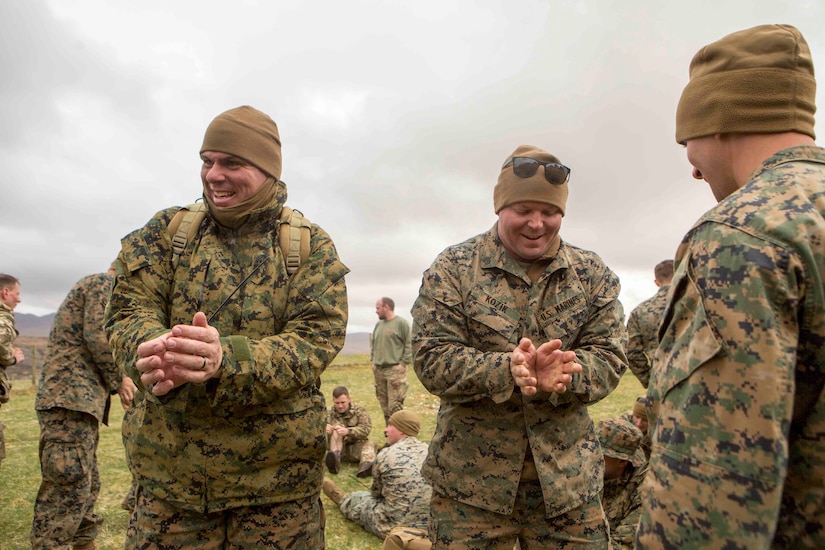By Marine Corps Cpl. Dallas Johnson, Marine Forces Reserve
DURNESS, Scotland -- One thing the general public knows,
without a doubt, is that Marines are tough. They go in, complete their
objective by any means necessary, and then get out as quickly as possible to
prepare for the next mission. But what the general public doesn't know is the
vast amount of time and effort that goes into ensuring those Marines come home
safe and successful.
For the Marine Corps Reservists of 4th Air Naval Gunfire
Liaison Company, Force Headquarters Group, who are treated to the daily high
heat and humidity of southern Florida, taking part in exercises outside their
comfort zone is what makes them successful in whatever they do.
Dismissing the warm weather of home, this year 4th ANGLICO
is in Durness, Scotland, from April 18-May 2 for their annual training. Here,
for Joint Warrior 18-1, their plan is to spend their two weeks focusing and
developing their ability to plan, coordinate and execute a multitude of live
fire operations with supporting partner nations.
Rare Opportunity
Aside from that overall objective, the Marines were given
the chance to take part in what many in the Marine Corps community can only
dream of -- survival training. Against the backdrop of the Scottish Highlands,
with its cold, rainy and windy landscape and mountainous terrain, survival can
depend on the way a Marine conducts his or her tasks, techniques and
procedures. This training offered a glimpse into what it would take to adapt to
operations in an environment that is both physically and mentally taxing.
“The Marines are going to learn how to build fires, forage
for food and prioritize work needs in order to not just survive but to get
rescued,” said Marine Corps Maj. Graham Perry, the officer in charge of 4th
ANGLICO, FHG. “We typically find ourselves in austere conditions and
environments. A lot of times in the past, we've been in the desert. As we start
to pivot to other regions of the world, this particular survival training will
help the Marines if they find themselves operating in these types of areas.
It's going to definitely add some tricks up their sleeve,” he said.
During the eight-hour wilderness training course, which
started the night before when the Marines were instructed to not eat anything
after dinner, 4th ANGLICO developed the necessary skills and procedures
required to stay alive in a potentially dangerous situation. This included the
basic components of survival; like prioritizing needs, hands-on training with
building shelters, how to properly make clean water and learning to catch and
clean game -- as well as what to do with every portion of it.
Mental Toughness, Teamwork
"The purpose of all this that I wanted to get across to
the Marines was the basic skills needed on how to survive, whether that be in a
hostile environment or being in an area they attacked and have to evade,” said
British Army Staff Sgt. Steven Kelly, a survival instructor with 29th Commando
Regiment, Artillery Battery. “If this happens in real life, it's going to be a
lot harder. Can they get through it? That's where the mental toughness comes
in. The most important thing, though, that I want 4th ANGLICO to take away is
the teamwork, it's what it all is. Here, it’s about survival and working as a
team. Working with ANGLICO has been amazing. And teaching these Marines what to
do has been great.”
For an ANGLICO Marine who happens to land in this seemingly
impossible, stressful situation, the simple act of working as a team and the
process of building a fire can warm a unit well enough to get an objective
completed. Instructors taught the Marines that the faster and harder they work,
the warmer they get. And, in the case of making clean water and fire and
building a suitable shelter, the resulting hard work pays dividends in the long
run.
As the day concluded, Kelly took it upon himself to teach
the Marines some techniques he learned during his time at survival, evasion,
resistance, and escape school. This included how to properly read time and
direction from the sun and several different ways to escape from extra wide
zip-tie handcuffs.
An ANGLICO unit's primary mission is to provide direct
support to various forces working within the Marine Corps’ battlespace, and to
conduct the coordination required in order for their commanders to access close
air support, artillery, rockets and naval gunfire.
With the specific cold-weather survival training learned
during Joint Warrior 18, 4th ANGLICO will continue their primary mission while
remaining in a constant state of readiness for their next successful mission,
regardless of clime and place.









No comments:
Post a Comment